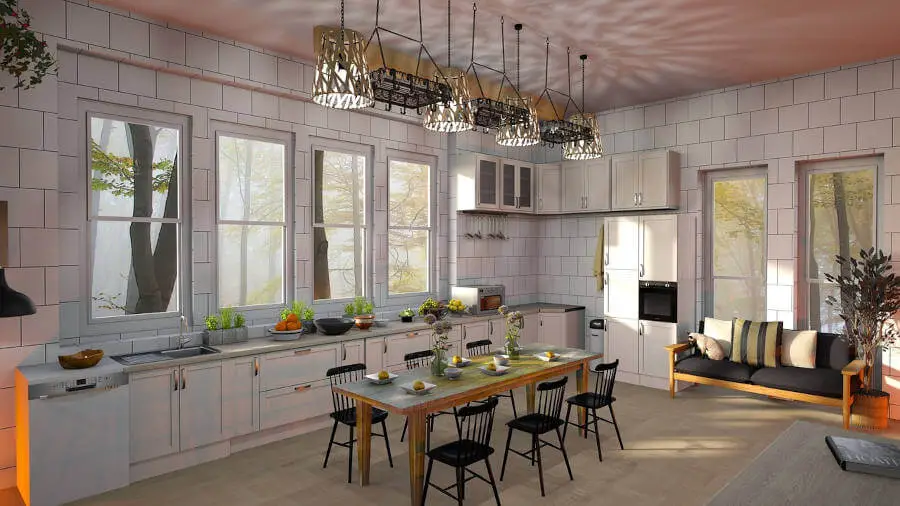Do you want balance and harmony in your kitchen? There’s no better way to balance your kitchen’s (and home) yin and yang other than using feng shui. Feng shui refers to the ancient Chinese art of placing objects—buildings and spaces in a setting in a harmonious balance that promotes peace and prosperity.
Once practiced in China, feng shui has begun gaining popularity in western culture. The Chinese believed that arranging objects and furniture (in homes) in a certain way could make families luckier, healthier, more prosperous, and even improve interpersonal relationships. This belief is the primary reason why many people globally have adapted feng shui rules in home decoration.
The easiest way to make your home more balanced and harmonious is by moving or adding one of the five elements, i.e., metal, earth, wood, fire, and water. All objects and furniture in your home fall under one of these elements, and mixing, removing, or combining them effectively improve a room’s flow of positive chi.
The kitchen is thought of as a significant room responsible for creating happy homes that are healthy and wealthy. This particular room is meant to radiate good energy in your home by producing a calming effect filled with positive chi. Learning the feng shui basics will help you create a kitchen that positively impacts your house.
While it is easier to rearrange bedrooms, living rooms, or an office, it’s often quite challenging to rearrange the kitchen. The primary reason for this is that kitchen structures are often static, and a change in design usually requires a complete makeover. That said, you could choose to remodel your kitchen or even make some small shifts to brighten your kitchen instantly.
Feng shui rules for kitchen
The kitchen shouldn’t be at the center of the house.
Kitchens have fire, an essential element often used to suppress positive and negative qi. Building your kitchen at the center of your home signals an attack on the heart, with the heart being your home’s central space.
Locating your kitchen in such a central location destabilizes the occupants, brings down their luck, and makes them less healthy. Other practical considerations include exposing your home to smoke, grease, and cooking fumes that drift off to other rooms, including your bedroom.
Related Reading: Common Things you Should NOT Keep at Home According to Feng Shui – Opens in new tab
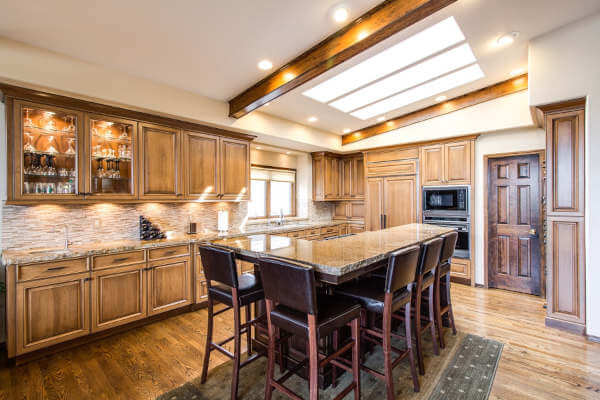
Don’t build your kitchen at the front of your home
The best location to place your kitchen should be at the back of your home rather than the front, just like your bedroom. There are many reasons for this; however, the most critical is that kitchens are private and best located in shielded places.
People in ancient periods believed that kitchens were a measure of wealth because people used them to produce food. Thus, placing your kitchen towards the back of your home showed your modesty and prevented your wealth from leaking away.
Don’t build your kitchen outside your home.
As mentioned before, the kitchen is perceived as producing wealth and prosperity (which pulls people close together). Placing it outside your home makes it difficult for productivity, wealth, and prosperity to gather inside your home.
Experts believe that placing your kitchen outside your home will increase the chances of family members living in different regions, making it difficult for you to have a family reunion. Cooking and eating together creates a strong bond that is not easily broken, which is why a kitchen should be located inside your home.
Don’t build your kitchen between 300˚ and 330˚ North-west of your home.
The 300˚-330˚ North-west section is connected with the male head of the family’s health. Placing your kitchen in this location produces various health issues, including high blood pressure, headaches, strokes, or other health-related conditions.
Male residents older than the head-of-household (also male) can also be affected by the kitchen placement. If your kitchen happens to lie within this location, then you will have to (at least) ensure that the stove isn’t.
Want to learn more about Feng Shui? Take a look at these Courses and Books – Aff.link
Don’t build your kitchen between 165˚ and 195˚ South of your home.
In houses with kitchens between 165 and 195 degrees, residents tend to be ill-tempered and develop undesired social relationships. If your kitchen is already located in this section, then the least you could do is ensure that the stove isn’t. Doing this reduces the side effects significantly.
Don’t build your kitchen between 345˚ and 15˚ North of your home.
Ensure that you don’t build your kitchen within 345 and 15 degrees north of your home. If it happens to be in that location, you have to ensure that the stove isn’t. Kitchens in this section lead to poor familial relations and affect the family’s marital relationship.
The kitchen shouldn’t face the front door.
Technically, this rule applies to the stove’s placement; however, some experts will argue that the kitchen’s door shouldn’t face the front door. This rule is challenging in American architecture, where kitchens often don’t have doors. Often (in such cases), the stove is looked at for reference.
The specifics of the rule state that there shouldn’t be a straight line of vision between the front door and the kitchen. Visitors (and other occupants in your home) should be able to see the stove to the side when coming into the house.
The kitchen’s fire demolishes individuals’ qi and makes them more likely to experience financial problems. You could solve this by placing a divider or heavy furniture between your home’s front door and the kitchen.
Related reading: Chinese Dining Etiquette and Table Manners – Opens in new tab
Base your kitchen’s location depending on your house’s Kua
This rule is so detailed that writing about it may require its article; however, I’ll give it my best. Your house’s Kua means that it has four lucky and unlucky sections. It would be best if you built your kitchen in one of the four unlucky sections since it’s intended to suppress the negative Qi.
Your restroom shouldn’t face your kitchen.
This is intuitive to some people; however, if you don’t know why you shouldn’t place your restroom opposite your kitchen, read on and find out. You make food in the kitchen and dispose of your bodily waste in the bathroom. Designing these two sections of your home to face each other will disrupt your appetite.
The restroom is filled with the water element, and placing it next to the kitchen produces a conflict between the fire and water elements, leading to many disruptions. If your home has this design, then the best solution is to ensure that the restroom’s door is closed at all times.
Take a look at some Feng Shui product ideas – Aff.link
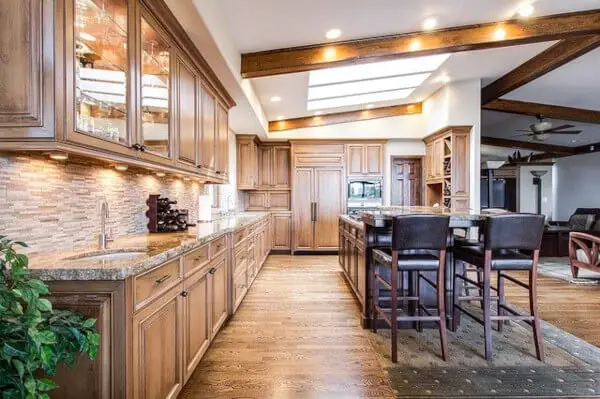
Don’t place your kitchen next to your bathroom.
This rule (just like the previous one) is more about individuals’ appetites. For instance, some individuals may find it hard to eat food prepared close to the bathroom. This rule is best practiced by businesses who prefer to hide their restrooms so that buyers don’t feel disgusted, which would affect food sales.
Kitchens shouldn’t face the bedroom.
This rule is more about hygiene than feng shui. For instance, the kitchen produces lots of smoke and grease that is harmful to your health. Inhaling fumes even while you sleep could affect your health negatively.
Plus, the smell of food could linger in the bedroom affecting your sleep quality. The best solution (if you cannot renovate your home) is to ensure that you close your bedroom door when cooking and that the kitchen is well-ventilated.
Your kitchen shouldn’t be located in the west.
This rule depends on the user’s home. For instance, experts support this rule because the kitchen tends to be warmer during the evening as the sun sets to the west, which causes the food to spoil more quickly.
However, this is not quite as relevant today since we can use fridges and freezers to store food for days and even weeks. Therefore, if you still believe your kitchen should be located in the west, it wouldn’t hurt to place it there.
Ensure your stove is supported by a wall
You should ensure that your stove isn’t designed as a center island. Ideally, it should have its back against the wall. Like the bed, kitchen, couch, and desk, the kitchen is a kitchen’s key element. Most feng shui experts say that using a stove located at the center of the kitchen is bad feng shui.
Some say that island stoves make it challenging for homeowners to get married, accumulate wealth, or have children. Others say that qi from various angles bounces into the stove and affects the food, which could cause varying health problems.
🍀 Our “Feng Shui Master” app is your trusted companion, offering a useful guide to implementing Feng Shui principles. Try it now!
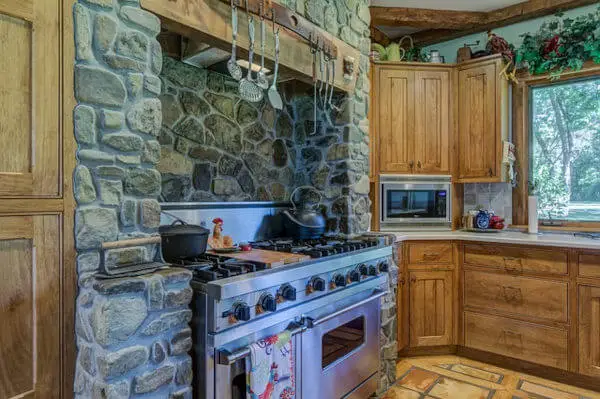
Be careful about the stove’s direction related to the house’s direction.
If your stove (at the back of the house) is installed so that it faces the opposite direction to that which the house faces, then there is the possibility that you’ll lose a vast amount of wealth. Keep in mind that the direction the house faces is not always the same as the front door’s direction.
Avoid installing beams on the cooking area or top of the stove.
Most feng shui experts avoid beams of artificial light because they produce suppressive qi. You could remedy this situation by using up-ward growing plants; however, it is not the best solution, especially in the kitchen area.
Beams can harm the people preparing meals and cause fluctuations of qi. Often, this affects your stove’s feng shui, which may cause the family to experience various ups and downs.
Related Reading: Eighteen Things that Bring Luck to Your Home According to Feng Shui–Opens in new tab
Other Feng Shui kitchen etiquettes
Don’t install mirrors in the kitchen.
Mirrors aren’t the best objects in the kitchen since they amplify the fire elements’ energy, which can cause imbalances and fluctuations in your life. Plus, kitchens have bad Feng Shui energies that you wouldn’t want your mirror amplifying.
Don’t place knives in plain sight.
A knife’s sharp nature gives it a form of negative qi, which is why some people feel uncomfortable when they see a knife in plain sight. However, not all feng shui experts agree with this.
Thus, the best approach would be to go with your gut. Don’t keep your knives hidden from plain sight if you feel like they aren’t a big deal. However, if you, other people in your home, or guests seem to have a problem with the knives, then it would be best if you put them away.
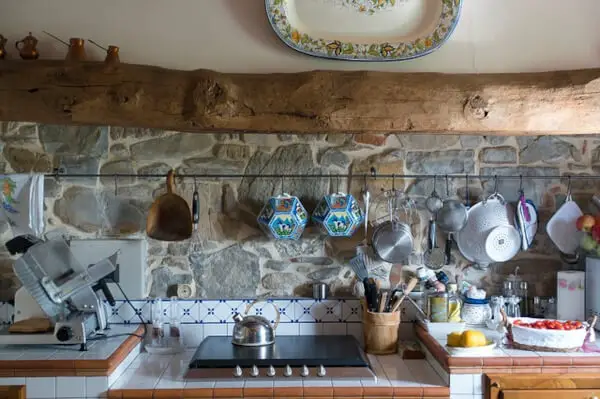
Feng shui tips for your Kitchen
Suitable colors for your kitchen
According to feng shui experts, selecting the blue color theme for your kitchen is no big deal and won’t clash with your kitchen’s fire element. While most people choose kitchen colors based on where the color is located depending on the Bagua, it’s advisable to select colors that you like and are comfortable with.
Don’t over-classify fire and water elements.
Some experts believe that kitchen appliances have their five elements, while others will advise you not to over-classify such objects. For instance, some experts will advise you not to place your stove next to your fridge since the water and fire elements would clash; however, fridges are still made of electricity, which is a type of fire.
Declutter your surface
Clear everything you don’t use off the counter and wash it with a natural cleaner. Ensure that everything is thoroughly clean before putting the essentials back on the counter and finding some storage space for the other items.
Ensure that the kitchen is clean
You prepare the food that provides sustenance for your entire family in the kitchen. Therefore, you must clear any food scraps, dirty utensils, and floors that could cause disease-causing bacteria to breed and create negative feng shui.
Conclusion
Feng shui is essential when you want it in your house, and (according to experts) arranging your home in such a way that it disrupts the flow of qi could affect your health, finance, and social relationships. Therefore, if you feel your home lacks proper feng shui, you could use these rules and tips to improve its feng shui. However, if you feel overwhelmed, you could always ask for help from an expert.
Take a look at some Feng Shui product ideas – Aff.link
Here are some of the most popular feng shui rules, organized by room, from our other articles.
- Feng Shui Rules and Tips for Your Front Door and its Surroundings
- Best Feng Shui Rules and Tips for the Living Room
- Basic Feng Shui Rules and Tips for Dining Room
- Basic Feng Shui Rules and Tips for Kitchen
- Basic Feng Shui Rules and Tips for the Bedroom
- How to Feng Shui Your Bathroom
- Basic Feng Shui Rules and Tips for Staircases and How to Apply them
- Simple Guide to Feng Shui Your Workspace
- Feng Shui Your Garden: Design Your Dream Garden with Feng Shui Principles
- Feng Shui Your Baby’s Room for Optimal Well-being
Stay in Touch
 Join our newsletter by using the forms on this website or click here!
Join our newsletter by using the forms on this website or click here! Follow us on Google News
Follow us on Google News Follow us on Facebook
Follow us on Facebook
Featured image from pixabay

